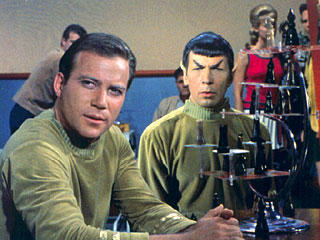I watched Star Trek IV Voyage Home on Monday. It felt July 4thy in some way, not sure why. (Doesn't Star Trek always?) As part of the Special Edition DVD, there were uncut interviews with the three big guns; I think they were practice interviews. You couldn't hear the interviewer, and there were a lot of starts and stops as film was changed or questions were revised, and none of the men were pumped up the way they would be for a live interview.
Anyway I came to some conclusions:
First, William Shatner is a lot smarter and a good deal more reserved than his persona. I always pictured William Shatner as being rather like Tim Allen's character is Galaxy Quest (excellent movie by the way): so invested in his persona that it's hard to tell the difference between the character and the actor. Not so, and my opinion of Shatner's acting ability went up. His depiction of the bumptious, over-confident Kirk is deliberate, not accidental.
Shatner has also had classical training: Shakespeare, etc. I'll talk more about this later, but it was clear from the interview that he considered Star Trek IV a bit of lite fluff (which it is, but Shatner was much more dismissive). But then it is clear from the interview that he hadn't yet made peace with his Kirk-self. All in all, the interview confirmed my opinion that Nimoy understands Shatner a great deal better than, for instance, Takei (who is one bitter guy if you've read his Star Trek autobiography).
Nimoy was Mr. Gregarious. Actually, whenever I've seen interviews with Nimoy, he is Mr. Gregarious. That whole cool, detached Spock thing is a bit of a front. His interview was much lengthier than the others. He got a little tired of it by the end. (How many times can you ask, "So will the fans like the movie?" in different ways? Shatner got so sick of it, he was practically curt.) The most cool thing about Nimoy is that he is a true gentleman; he has never descended, like some of the Star Trek gang, to rudeness towards the fans or to the other actors. He has tut-tutted the studio a bit, but as far as I can tell that's par for the course with studios.
Now Nimoy, like Shatner, has worried about his acting career being co-opted by his character: that green, pointy-eared man from Vulcan. But by the time he directed Star Trek IV, he'd obviously made peace with it. He wrote the I Am Not Spock book in 1976, I Am Spock in the mid-90s. At some point, he realized, okay, this is my career, and hey, the Vulcan isn't a bad guy to be.
But Shatner's interview revealed a deeply unhappy man, who didn't want to live this same role over and over and over. At one point the interviewer said, "You come across as an ensemble cast." "Thank you," Shatner said, "because, of course, we aren't really. An ensemble cast is like the National Theatre in London where the cast lives and works together on pieces on a continual basis. We just come together every two to three years." In his rather nasty book, Takei accuses Shatner of being pompous and vain, etc. etc. because he won't show up to every single Star Trekky thingy with everybody else. My initial thought was, "Hey, the Vulcan likes him. Shut up, Sulu." My second thought, on seeing this interview, is that Shatner is far more reserved and far more reluctant to "be" Kirk than he has been painted.
I think, though, that Shatner has made peace with Kirk. He wrote a book about Star Trek conventions in 1999. He'd been very contemptuous of Star Trek conventions for a long time, but he finally decided to take another look (he was probably offered a contract to write a Star Trek memoir by a publisher). So he dressed up (disguised, which should tell you something) and went around convention halls and talked to people. The book is very upbeat. Since he has gone on to author some Star Trek novels, I'd say his anti-Trek feelings have been replaced by, well, acceptance at least.
 The last interview is with DeForest Kelly, who is a total kick! The interview reminded me of Jonathan Frakes (ST:TNG's Riker) who pretty much declared, "Hey, this
is as good as I am. I'm lucky to have this career," and married a model
and started directing TV shows. Kelley comes off exactly the same way.
He is a Hollywood careerist. That is, he works for Hollywood: heavies,
background, whatever. There's no angst. I doubt he even cares if he can
act. It's a job. This job turned out better than most. Well, what do you
know!?
The last interview is with DeForest Kelly, who is a total kick! The interview reminded me of Jonathan Frakes (ST:TNG's Riker) who pretty much declared, "Hey, this
is as good as I am. I'm lucky to have this career," and married a model
and started directing TV shows. Kelley comes off exactly the same way.
He is a Hollywood careerist. That is, he works for Hollywood: heavies,
background, whatever. There's no angst. I doubt he even cares if he can
act. It's a job. This job turned out better than most. Well, what do you
know!?
So that's the interviews. As for the movie, the text commentary is great although the fact that it is text is a bit annoying. I'd rather the commentators had spoken. But the commentary was the kind of thing I approve of: info, facts, tid-bits, bloppers, a little humor. None of that rather pointless "Uh, look Bob, do you remember that part?" "Oh, sure, Gary, yeah, yeah, I do."


No comments:
Post a Comment